虚拟语气十大句型
常见的虚拟语气句型
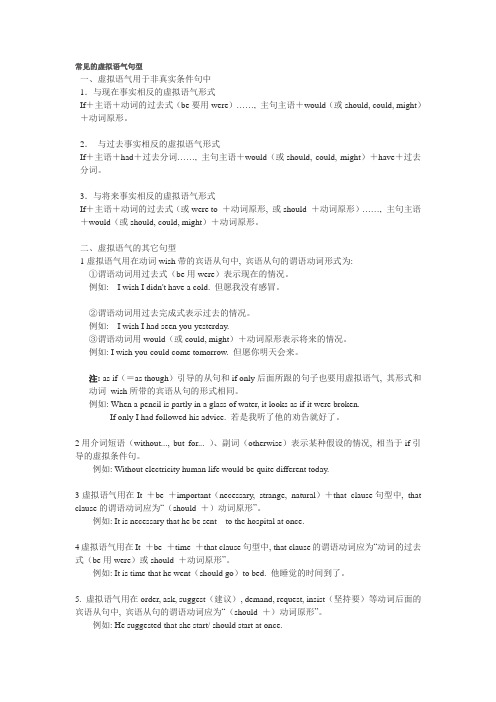
常见的虚拟语气句型一、虚拟语气用于非真实条件句中1.与现在事实相反的虚拟语气形式If+主语+动词的过去式(be要用were)……, 主句主语+would(或should, could, might)+动词原形。
2.与过去事实相反的虚拟语气形式If+主语+had+过去分词……, 主句主语+would(或should, could, might)+have+过去分词。
3.与将来事实相反的虚拟语气形式If+主语+动词的过去式(或were to +动词原形, 或should +动词原形)……, 主句主语+would(或should, could, might)+动词原形。
二、虚拟语气的其它句型1虚拟语气用在动词wish带的宾语从句中, 宾语从句的谓语动词形式为:①谓语动词用过去式(be用were)表示现在的情况。
例如: I wish I didn't have a cold. 但愿我没有感冒。
②谓语动词用过去完成式表示过去的情况。
例如: I wish I had seen you yesterday.③谓语动词用would(或could, might)+动词原形表示将来的情况。
例如: I wish you could come tomorrow. 但愿你明天会来。
注: as if(=as though)引导的从句和if only后面所跟的句子也要用虚拟语气, 其形式和动词wish所带的宾语从句的形式相同。
例如: When a pencil is partly in a glass of water, it looks as if it were broken.If only I had followed his advice. 若是我听了他的劝告就好了。
2用介词短语(without..., but for... )、副词(otherwise)表示某种假设的情况, 相当于if引导的虚拟条件句。
例如: Without electricity human life would be quite different today.3虚拟语气用在It +be +important(necessary, strange, natural)+that clause句型中, that clause的谓语动词应为“(should +)动词原形”。
特殊句型中的虚拟语气
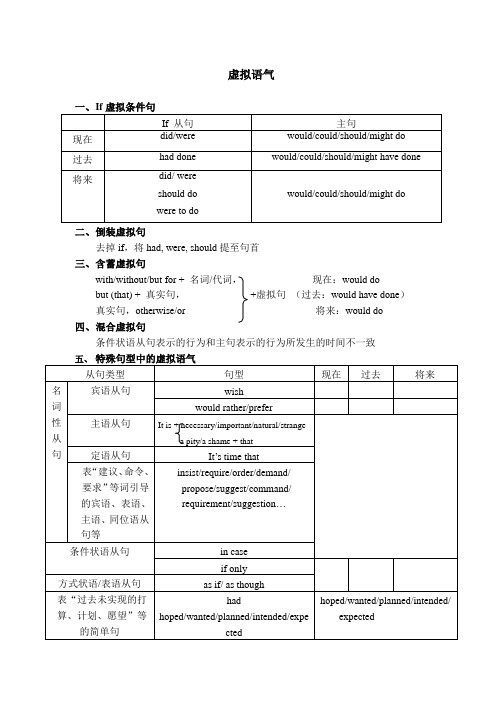
虚拟语气二、 倒装虚拟句去掉if ,将had, were, should 提至句首 三、 含蓄虚拟句with/without/but for + 名词/代词, 现在:would dobut (that) + 真实句, +虚拟句 (过去:would have done ) 真实句,otherwise/or 将来:would do 四、 混合虚拟句条件状语从句表示的行为和主句表示的行为所发生的时间不一致Exercises:1. Goerge is going to talk about the geography of his country, but I’d rather he _____ more on its culture. (2010江苏)A. focusB. focusedC. would focusD. had focused2. Teachers recommend parents _____ their children under 12 to ride bicycles to school for safety. (2010福建)A. not allowB. do not allowC. mustn’t allowD. couldn’t allow3. Eliza remembers everything exactly as if it _____ yesterday. (2006全国)A. was happeningB. happensC. has happenedD.happened4. It’s about time we _____ to the theater.A. will goB. shall goC. are goingD. went5. If only I _____ my money and ID card.A. hadn’t lostB. haven’t lostC. didn’t loseD. don’t lose6. It is stange that he _____ so.A. would sayB. talkC. should sayD. will speak7. – It was a pity that you did not finish the whole task well.-- Given more time, I _____ much better.A. can doB. would doC. could have doneD. had done8. If he _____ my advice, he wouldn’t have lost his job. (2010湖南)A. followedB. should followC. had followedD. would follow9. Had I know about this computer program, a huge amount of time and energy _____.(2010浙江)A.would have been savedB. had been savedC. will be savedD. was saved10. But for the help of my English teacher, I _____ the first prize in the English Writing Competition. (2009福建)A. would not winB. would not have wonC. would winD. would have won11. Thank you for all your hard work last week. I don’t think we _____ it without you. (2008山东)A. can manageB. could have managedC. could manageD. can have managed12. They _____ two free tickets to Canada, otherwise they’d never have been able to afford to go. (2007山东)A.had gotB. gotC. have gotD. getWith your help, we might finish the plan earlier.Without music, the world would be a dull(枯燥的) place.But for your advice, I would have failed.I was ill that day. Otherwise, I would have taken part in the sports meet.He telephoned to tell me of your birthday, or / otherwise I would have known nothing about it.I would have help you, but I was busy then.If he had not stayed up last night, he would not be so sleepy now.If they had studied hard, they could do it more easily now.I wish I were a bird. I wish I could fly.I wish I hadn’t eaten so much watermelon.I wish it would rain tomorrow.He looks as if he were an African.He talked as if he had been to America.If only I were a rich man!If only I hadn't been so careless in the exam!I would rather we stopped now.I would rather she hadn’t done that yesterday.1.It is important that we ( should ) master a foreign language.2. It is strange that she (should) refuse to come to the party.3. It’s a pity that he (should) have missed the lecture.It’s high time that you went. .It’s high time that you should go.(1)We suggest that he (should) give less money to his child.(2)It is suggested that he (should) give less money to his child.(3)Our suggestion is that he (should) give less money to his child..要是有你的帮助,我们就可以早些完成计划。
虚拟语气句型
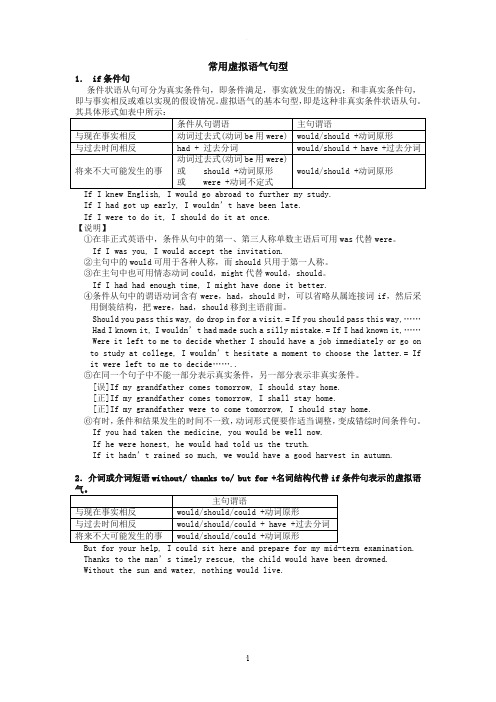
常用虚拟语气句型1.if条件句条件状语从句可分为真实条件句,即条件满足,事实就发生的情况;和非真实条件句,即与事实相反或难以实现的假设情况。
虚拟语气的基本句型,即是这种非真实条件状语从句。
If I had got up early, I wouldn’t have been late.If I were to do it, I should do it at once.【说明】①在非正式英语中,条件从句中的第一、第三人称单数主语后可用was代替were。
If I was you, I would accept the invitation.②主句中的would可用于各种人称,而should只用于第一人称。
③在主句中也可用情态动词could,might代替would,should。
If I had had enough time, I might have done it better.④条件从句中的谓语动词含有were,had,should时,可以省略从属连接词if,然后采用倒装结构,把were,had,should移到主语前面。
Should you pass this way, do drop in for a visit.= If you should pass this way,…… Had I known it, I wouldn’t had made such a silly mistake.= If I had known it,…… Were it left to me to decide whether I should have a job immediately or go on to study at college, I wouldn’t hesitate a moment to choose the latter.= If it were left to me to decide……..⑤在同一个句子中不能一部分表示真实条件,另一部分表示非真实条件。
4句话搞定英语最难语法:虚拟语气10大必背句式(10=1234)
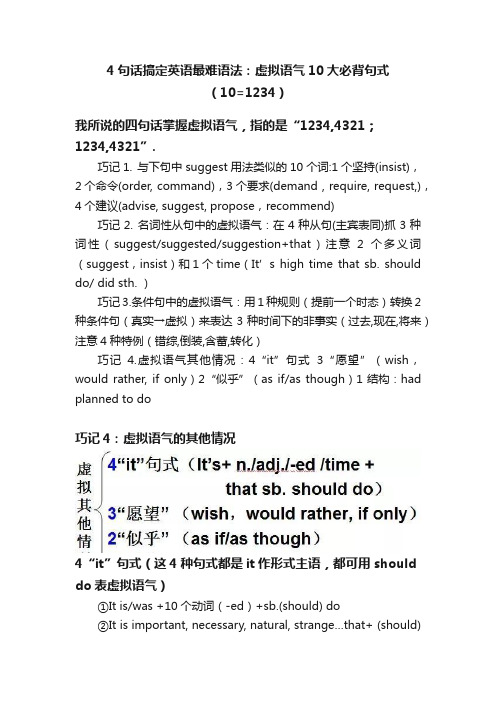
4句话搞定英语最难语法:虚拟语气10大必背句式(10=1234)我所说的四句话掌握虚拟语气,指的是“1234,4321;1234,4321”.巧记1. 与下句中suggest用法类似的10个词:1个坚持(insist),2个命令(order, command),3个要求(demand , require, request,),4个建议(advise, suggest, propose,recommend)巧记2. 名词性从句中的虚拟语气:在4种从句(主宾表同)抓3种词性(suggest/suggested/suggestion+that)注意2个多义词(suggest,insist)和1个time(It’s high time that sb. should do/ did sth. )巧记3.条件句中的虚拟语气:用1种规则(提前一个时态)转换2种条件句(真实→虚拟)来表达3种时间下的非事实(过去,现在,将来)注意4种特例(错综,倒装,含蓄,转化)巧记4.虚拟语气其他情况:4“it”句式3“愿望”(wish,would rather, if only)2“似乎”(as if/as though)1结构:had planned to do巧记4:虚拟语气的其他情况4“it”句式(这4种句式都是it作形式主语,都可用should do表虚拟语气)①It is/was +10个动词(-ed)+sb.(should) do②It is important, necessary, natural, strange…that+ (should)do③It is a pity, a shame, no wonder… that+ (should) do④It is (high/about) time that sb. should do/did sth.(should不可省略)例句和更详细解析可点击扩展资料参照前文《虚拟语气——名词性从句中的虚拟语气:4句话搞定最难语法(1)》3“愿望”(wish希望 would rather宁愿 if only要是…就好了)表示愿望与现在或过去事实相反,或对于将来的愿望,这就是虚拟语气,也是提前一个时态。
虚拟语气15种句型
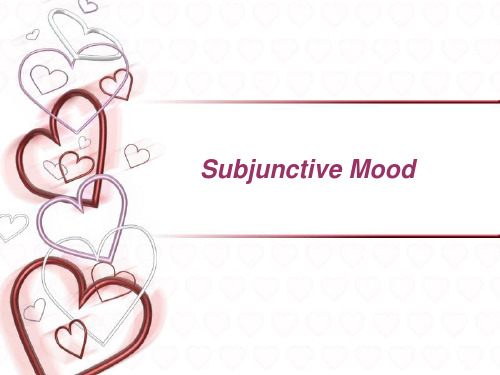
3.as if / as though后的表语或状语从句 (与wish相同)
含义 动 词 形 式
例句
现在 did / were
He looks as if he knew the little girl.
过去 Have done
It appeared as if nothing had
happened.
5.动词形式为(should)+do 的虚拟
2. It’s + adj.+that 的主语从句 (adj: necessary / essential/
important / natural / strange / possible / impossible
eg. It is important that we should attend the meeting.
• 对过去的猜测 • 肯定 must have done • 否定 can / could not have done • 可能 may / might have done
• 本应该做(实际没有做,有责备意思) • should have done • shouldn’t have done • 本来有必要作(实际没有做,不含责
desire 命令:order / command/ 坚持:insist 不管是动词还是名词,不管是主动还是被动
,不管是引导主语从句, 宾语从句, 表语 从句还是同位语从句, 都要用(should) do
5.动词形式为(should)+do 的虚拟
• My suggestion is that we should listen to his opinion first.
It is time that we stopped work and went home.
虚拟语气用法汇总

虚拟语气用法汇总一、虚拟语气在条件句中eg: If I had time, I would attend the meeting.If he had hurried, he could have caught the train.If I were to go abroad, I would go to America.注意:虚拟语气中的省略在条件句中,可省略if,把were ,had, should 提到句首,变为倒装句式.If I were at school again, I would study harder.Were I at school again, I would study harder.If you had come earlier, you would have met him.Had you come earlier, you would have met him.If it should rain tomorrow, we would not go climbing.Should it rain tomorrow, we would not go climbing.二、虚拟语气在名词从句中的运用(1)用于宾语从句1、用于wish后面的宾语从句中。
一般用虚拟语气,表示一种不可能实现的愿望。
其谓语动词形式为:表现在→过去时表过去→过去完成时表将来→would, might, could+动词原形I wish (that) I were a bird.I wish (that) I had seen the film last night.I wish (that) I would/could go.2、用于表示命令、建议、要求等一类词后面的宾语从句中谓语动词用:(should)+ 动词原形。
insist, order, command, suggest, advise, propose, require, request, demand, desire etc. We suggested that the meeting (should) be put off.They insisted that the boy (should) go with them.注意:suggest 当表示“暗示、表明“讲时,insist 表示“坚持认为”之意时,应用陈述语气。
高中英语虚拟语气(绝对全)

If my brother were here, everything would be all right. 要是我哥哥在这儿,一切都没问题虚拟语气表示所说的话只是一种主观愿望、假设或建议等。
虚拟语气的重点是:虚拟语气的特殊形式,即用来表示要求、建议、命令、提议、意愿等的主语从句、宾语从句、表语从句和同位语从句中的虚拟形式,含蓄条件句中的虚拟语气和表示愿望的虚拟形式等。
(一)虚拟语气的常见句型●与现在事实相反的虚拟语气与现在相反的虚拟语气的结构为:条件句动词为were或动词的过去式,主句为would/should/could/might+动词原形了。
If you had taken my advice,you wouldn't (couldn’t) have failed in the exam. 如果你按●与过去事实相反的虚拟语气与过去相反的虚拟语气的结构为:从句用had+过去分词,主句用would/should/could/might+have done照我的建议去做,你一定不会(不可能)考试不及格。
●与将来事实相反的虚拟语气If it were Sunday tomorrow, I should (would,could,might) go to see my grandmother. 与将来相反的虚拟语气的结构为:从句谓语动词为动词过去式或“should+动词原形”或“were to+动词原形”,主句为would/could/might +动词原形如果明天是星期天,我就(可能)去看望我奶奶。
If it were to snow this evening, they would not go out. 如果今晚下雪,他们将不出去了。
●省略if形式的虚拟语气有时条件从句中的动作和主句中的动作发生的时间不一致(表示错综时间的虚拟语气),省略连词if。
在书面语中,如果虚拟条件从句中有were,had 或should,可以把if省略,把这几个词放到主语之前,构成主谓倒装。
虚拟语气用法总结(完整)
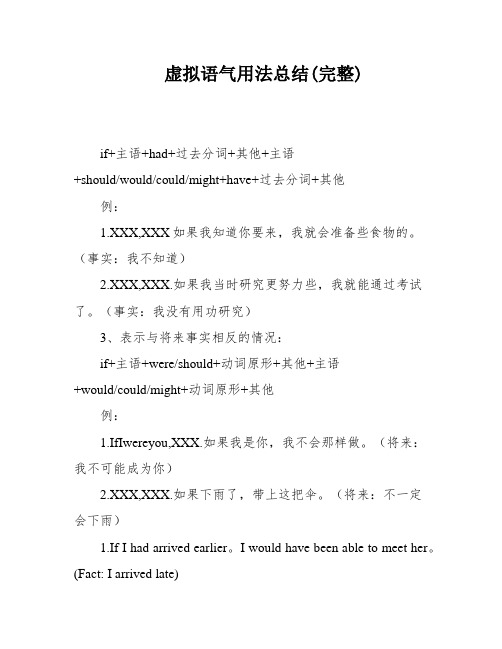
虚拟语气用法总结(完整)if+主语+had+过去分词+其他+主语+should/would/could/might+have+过去分词+其他例:1.XXX,XXX如果我知道你要来,我就会准备些食物的。
(事实:我不知道)2.XXX,XXX.如果我当时研究更努力些,我就能通过考试了。
(事实:我没有用功研究)3、表示与将来事实相反的情况:if+主语+were/should+动词原形+其他+主语+would/could/might+动词原形+其他例:1.IfIwereyou,XXX.如果我是你,我不会那样做。
(将来:我不可能成为你)2.XXX,XXX.如果下雨了,带上这把伞。
(将来:不一定会下雨)1.If I had arrived earlier。
I would have been able to meet her。
(Fact: I arrived late)2.If he had XXX my advice。
he would not have made such a mistake。
(Fact: He didn't listen to me)3.If he were to come here tomorrow。
I would talk to him。
(Fact: It's XXX he will come)In expressing ns。
orders。
requests。
etc。
the subjunctive mood is often used in the object clause。
with the verb in the form of "should + infinitive," which can be omitted.Other uses of XXX:1.The subjunctive mood is used in the object clause after "wish" to express a XXX fact。
虚拟语气,汉译英句型
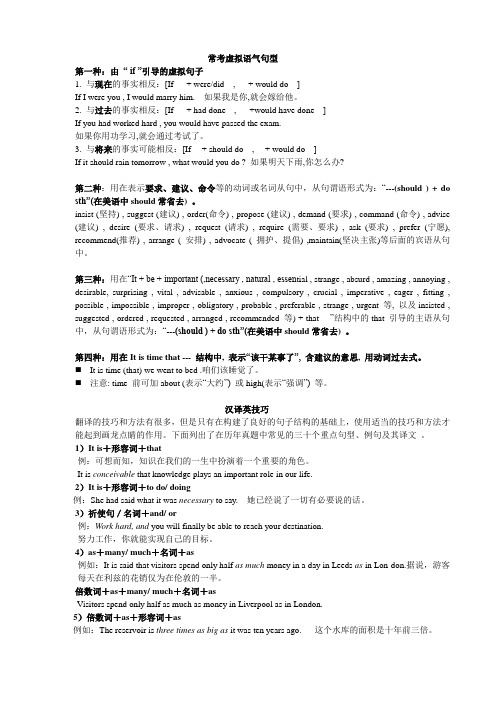
常考虚拟语气句型第一种:由“ if ”引导的虚拟句子1. 与现在的事实相反:[If --- + were/did---, --- + would do---]If I were you , I would marry him. 如果我是你,就会嫁给他。
2. 与过去的事实相反:[If --- + had done---, --- +would have done---]If you had worked hard , you would have passed the exam.如果你用功学习,就会通过考试了。
3. 与将来的事实可能相反:[If ---+ should do---, ---+ would do---]If it should rain tomorrow , what would you do ? 如果明天下雨,你怎么办?第二种:用在表示要求、建议、命令等的动词或名词从句中,从句谓语形式为:“---(should ) + do sth”(在美语中should常省去) 。
insist (坚持) , suggest (建议) , order(命令) , propose (建议) , demand (要求) , command (命令) , advise (建议) , desire (要求、请求) , request (请求) , require (需要、要求) , ask (要求) , prefer (宁愿), recommend(推荐) , arrange ( 安排) , advocate ( 拥护、提倡) ,maintain(坚决主张)等后面的宾语从句中。
第三种:用在“It + be + important (,necessary , natural , essen tial , strange , absurd , amazing , annoying , desirable, surprising , vital , advisable , anxious , compulsory , crucial , imperative , eager , fitting , possible , impossible , improper , obligatory , probable , preferable , strange , urgent 等, 以及insisted , suggested , ordered , requested , arranged , recommended 等) + that ---”结构中的that 引导的主语从句中,从句谓语形式为:“---(should ) + do sth”(在美语中should常省去) 。
四级翻译句型精讲--虚拟语气

一、虚拟语气
2.The King ordered that the man be released . 国王命令释放那个人。
一、虚拟语气
6.用于“It is /was +adj+that (clause) +(should)+verb 形容词有 advisable , appropriate , desirable , essential , imperative(紧要的, 必要的),important , proper, vital等。
句型练习
1.但愿我年轻10岁。 2.我要是有更多时间思考这个问题就好了。 3.我希望你闭上嘴。
1.I wish I were ten years yonger . 2.If only I had more time to think about it. 3.I wish you should shup up.
句型练 soup would taste better if it had more salt in it. 2.I should be a bit more careful if I were you. 3.If I had not seen it with my own eyes, I would not have believed. 4.If it had not been for your help , he would not have succeeded. 5.If you should change your mind , no one would blame you. 6.If your father knew this tomorrow, he would be angry.
常用的虚拟语气句式

常用的虚拟语气句式1.It is time (that)…句型It is (high)time that + S + V(虚拟语气)…例:It is high tome that you children went to bed.(你们小孩子们应该是早已上床在睡的时候了。
)注意:在说话时按正常作息时间小孩子们应已在床睡觉,可是事实上这些小孩在说话时还没睡,这正与事实相反,所以“that…”的动词应使用表达与现在事实相反的虚拟语气过去时。
又句式中的“high”是用于加强语气。
2、“wish(that)从句…”句型S + wish +(that)+ S + V(虚拟语气动词)…例:I wish (that)I were a frog.(但愿我是一只青蛙。
)例:I wish (that)I could swim like a frog.(但愿我能游得像一只青蛙。
)注意如例所示,“wish”的宾语“that…”的动词要使用虚拟语气的动词形式来表达,其一致的规则如下:1、S + wish …S + did (与现在事实相反).2.S + wish …S + had + p.p.(与过去事实相反)…3.S + wished …S + had + p.p.(与更以前的事实相反)例:I wish I were as tall as that big tree.(但愿我如那棵大树一样地高。
)例:I wish I had told her the truth yesterday.(我真希望我昨天向她说了真话。
——事实是没有说,而我现在觉得很后悔。
)例:At that time I wished I were a doctor.(当时我真希望我是一个医师。
——事实是我并不是医师。
)例:He wished he had learned Chinese before he came to China.(他希望他来中国之前先学了中文就好了。
虚拟语气讲义(15个句式)

虚拟语气讲义1.虚拟语气句型1If + were/ did/ (动词的过去式), 主语+would/ might/ should / could + do 。
(表示对现在的假设)eg. If I were you, I would not be so proud . 如果我是你,我不会如此自负.eg. I don’t have a cellphone. If I had one , it would be convenient for me to get in touch with others 我没有手机,如果我有手机的话,和别人联系就方便的多了。
eg. If I were in your position, I would think better of it .如果我处在你现在的境地,我会重新考虑然后放弃。
2. 虚拟语气句型2If + had done, 主语+would/ might/ should / could + have done表示对过去或已经发生事情的虚拟假设。
eg. What a pity it is that you didn’t attended the concert yesterday! If you had attended the concert, you would have seen the famous singer.真遗憾你昨天没有去听音乐会。
如果你去了,你就会见到那位名歌手。
eg. Anyone in his position would have done the same= If anyone had been in his position, he would have done the same.3. 虚拟语气句型3If + were/ did(动词过去式)/should/ were to do , 主语+would/ might/ should / could + do (表示对将来的假设).eg. If he should refuse (= if he were to refuse = if he refused ), it wouldn’t matter万一他拒绝了. 那也没有什么关系.eg. If you shouldn’t pass the college entrance e*amination, what would you do"万一你高考不中,你该怎么办?4. 虚拟语气条件句的倒装在虚拟条件句中,如果出现有were, had, should,可省去if,可将主语与这些词倒装,构成虚拟倒装句。
虚拟语气经典例句
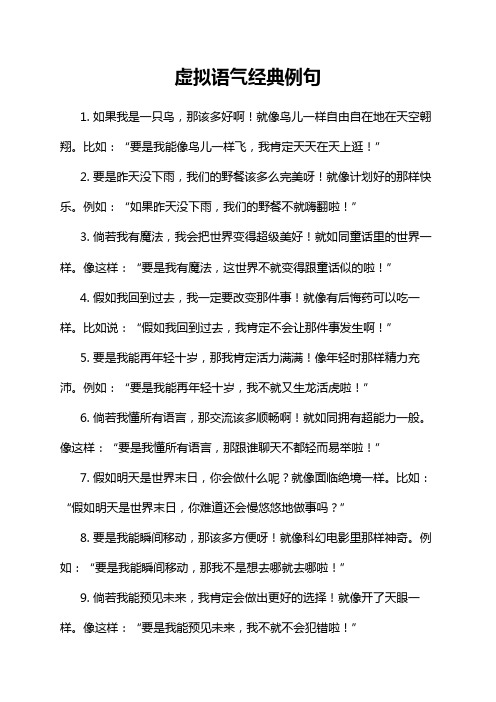
虚拟语气经典例句
1. 如果我是一只鸟,那该多好啊!就像鸟儿一样自由自在地在天空翱翔。
比如:“要是我能像鸟儿一样飞,我肯定天天在天上逛!”
2. 要是昨天没下雨,我们的野餐该多么完美呀!就像计划好的那样快乐。
例如:“如果昨天没下雨,我们的野餐不就嗨翻啦!”
3. 倘若我有魔法,我会把世界变得超级美好!就如同童话里的世界一样。
像这样:“要是我有魔法,这世界不就变得跟童话似的啦!”
4. 假如我回到过去,我一定要改变那件事!就像有后悔药可以吃一样。
比如说:“假如我回到过去,我肯定不会让那件事发生啊!”
5. 要是我能再年轻十岁,那我肯定活力满满!像年轻时那样精力充沛。
例如:“要是我能再年轻十岁,我不就又生龙活虎啦!”
6. 倘若我懂所有语言,那交流该多顺畅啊!就如同拥有超能力一般。
像这样:“要是我懂所有语言,那跟谁聊天不都轻而易举啦!”
7. 假如明天是世界末日,你会做什么呢?就像面临绝境一样。
比如:“假如明天是世界末日,你难道还会慢悠悠地做事吗?”
8. 要是我能瞬间移动,那该多方便呀!就像科幻电影里那样神奇。
例如:“要是我能瞬间移动,那我不是想去哪就去哪啦!”
9. 倘若我能预见未来,我肯定会做出更好的选择!就像开了天眼一样。
像这样:“要是我能预见未来,我不就不会犯错啦!”
10. 假如时间可以停止,那该是多么奇妙的事啊!就像进入了一个奇幻的世界。
比如说:“假如时间可以停止,那一切不都静止啦!”
我觉得虚拟语气真的很神奇,可以让我们想象出很多不可能的事情,给我们的思维带来无限的可能!。
英语虚拟语气语法总结
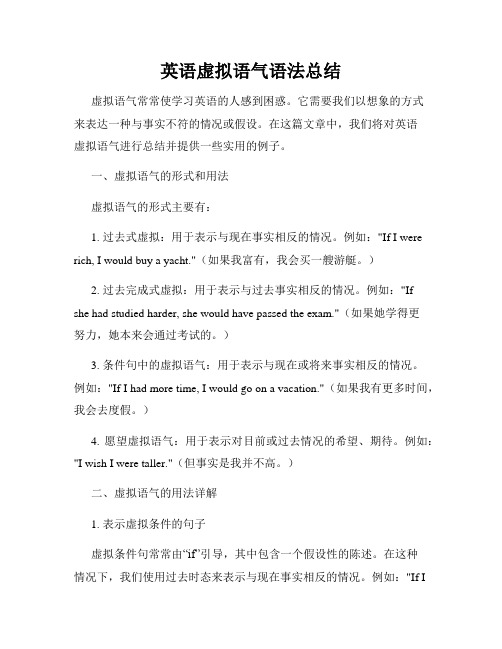
英语虚拟语气语法总结虚拟语气常常使学习英语的人感到困惑。
它需要我们以想象的方式来表达一种与事实不符的情况或假设。
在这篇文章中,我们将对英语虚拟语气进行总结并提供一些实用的例子。
一、虚拟语气的形式和用法虚拟语气的形式主要有:1. 过去式虚拟:用于表示与现在事实相反的情况。
例如:"If I were rich, I would buy a yacht."(如果我富有,我会买一艘游艇。
)2. 过去完成式虚拟:用于表示与过去事实相反的情况。
例如:"If she had studied harder, she would have passed the exam."(如果她学得更努力,她本来会通过考试的。
)3. 条件句中的虚拟语气:用于表示与现在或将来事实相反的情况。
例如:"If I had more time, I would go on a vacation."(如果我有更多时间,我会去度假。
)4. 愿望虚拟语气:用于表示对目前或过去情况的希望、期待。
例如:"I wish I were taller."(但事实是我并不高。
)二、虚拟语气的用法详解1. 表示虚拟条件的句子虚拟条件句常常由“if”引导,其中包含一个假设性的陈述。
在这种情况下,我们使用过去时态来表示与现在事实相反的情况。
例如:"If Iwere you, I would apologize."(如果我是你,我会道歉。
)这里的“were”是过去式虚拟的一种形式,用来表示与现实情况不符的假设。
2. 表示与过去事实相反的虚拟语气过去完成式虚拟经常出现在假设条件中。
例如:"If she had told him the truth, he wouldn't have been angry."(如果她告诉了他真相,他不会生气。
虚拟语气用法归纳

虚拟语气用法归纳1、在非真实条件句中,谓语动词用虚拟语气。
非真实条件有以下三类:(1)与现在事实相反的非真实条件句,谓语动词形式如下:从句:过去时主句:would/should/could/might+动词原形。
如If I were you, I would ask our teacher for advice.如果我是你的话,我就请教老师。
(2)与过去事实相反的非真实条件句,谓语动词形式如下:从句:过去完成时主句:would/should/could/ might +have+动词过去分词。
如If I hadn’t taken the wrong bus, I wouldn’t have missed the contest.如果我没有搭错车,我就不会不参加竞赛。
(3)与将来事实相反的非真实条件句,谓语动词形式如下:从句:过去时/should /were to +动词原形主句:would/should/could/might+动词原形。
如If I had enough money next month, I would buy a copy of “The Advanced Learner’s Dictionary of Current English”.如果我下个月有足够的钱,我就会买一本《现代高级英语学习词典》。
(4)混合时间条件句:主句和从句不一定用指同一时间的动词。
如If I had learned French, I would be able to interpret for our French friend.假如我以前学过法语,现在就能给我们的法国朋友当翻译。
If you had not watched television so late last night,you would not be sleepy now. Had you followed the doctor’s suggestion ,you would be fine now.(注:if从句与过去事实相反,用过去完成时;而主句与现在事实相反,用would+动词原形。
虚拟句型结构及用法
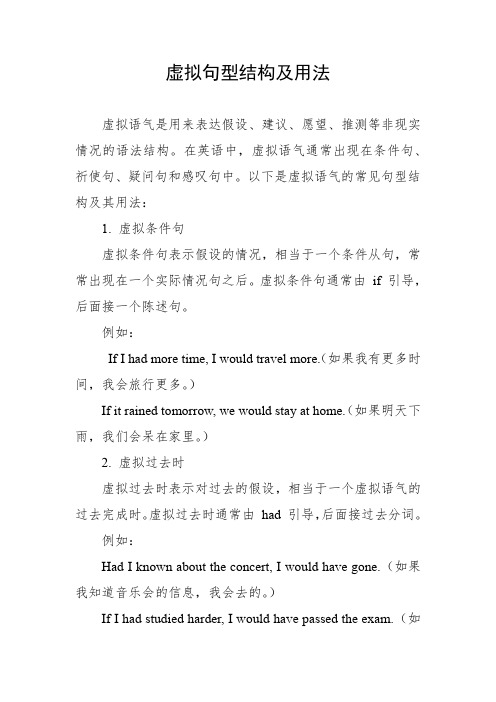
虚拟句型结构及用法虚拟语气是用来表达假设、建议、愿望、推测等非现实情况的语法结构。
在英语中,虚拟语气通常出现在条件句、祈使句、疑问句和感叹句中。
以下是虚拟语气的常见句型结构及其用法:1. 虚拟条件句虚拟条件句表示假设的情况,相当于一个条件从句,常常出现在一个实际情况句之后。
虚拟条件句通常由if 引导,后面接一个陈述句。
例如:If I had more time, I would travel more.(如果我有更多时间,我会旅行更多。
)If it rained tomorrow, we would stay at home.(如果明天下雨,我们会呆在家里。
)2. 虚拟过去时虚拟过去时表示对过去的假设,相当于一个虚拟语气的过去完成时。
虚拟过去时通常由had 引导,后面接过去分词。
例如:Had I known about the concert, I would have gone.(如果我知道音乐会的信息,我会去的。
)If I had studied harder, I would have passed the exam.(如果我学习得更努力,我会通过考试的。
)3. 虚拟将来时虚拟将来时表示对将来的假设,相当于一个虚拟语气的将来时。
虚拟将来时通常由should 或were to 引导,后面接动词原形。
例如:Should I go to the party?(我应该去参加聚会吗?)If she were to call me, what would I say?(如果她给我打电话,我会说些什么?)4. 虚拟祈使句虚拟祈使句表示对过去或将来的建议、命令或请求。
虚拟祈使句通常由should 或were to 引导,后面接动词原形。
例如:Should I go to the doctor?(我应该去看医生吗?)If I were to ask him, what would he say?(如果我问他,他会怎么说?)5. 虚拟感叹句虚拟感叹句表示对假设的情况的感叹。
虚拟语气

虚拟语气句型 1 (与现在事实相反)在条件句中用虚拟语气是表示对现在情况的假设,是一种非真实条件句。
句型:If +主语did (were)…,主语would do …主句中除了would之外,还可用情态动词could, might, should.If I were you, I would (could, might, should) help him.虚拟语气句型 2 (与过去事实相反)句型2是对过去情况的假设,表示与过去事实相反的条件和结果。
句型:If 主语 had done,主语 +would have done虚拟语气句型 3 (与将来事实相反)句型3是对将来情况的假设,表示与将来事实相反或可能相反的条件和结果。
句型:If +主语were to / should + 动词原形…,主语woulddo…虚拟语气句型 4 (错综时间虚拟条件句)有时条件从句和主句所表示的动作在时间上可以不一致(例如一个与过去事实相反,另一个与现在事实相反),这种虚拟条件句就称为错综时间虚拟条件句。
在这种条件句中,动词的形式要根据具体情况进行调整。
例句:She would never have behaved like that if she had some common sense.如果她有一些常识的话,她就决不会像那样做了。
If he had listened to me, he would not be in such trouble now.如果他听了我的话,他现在就不会有这样的麻烦。
If I had a bike (now), I would have lent it to you yesterday.假如我有自行车,昨天早就借给你了。
If you had not studied the problem carefully, you would find difficulty now.如果当初你没有认真研究这个问题,现在你就会遇到困难。
- 1、下载文档前请自行甄别文档内容的完整性,平台不提供额外的编辑、内容补充、找答案等附加服务。
- 2、"仅部分预览"的文档,不可在线预览部分如存在完整性等问题,可反馈申请退款(可完整预览的文档不适用该条件!)。
- 3、如文档侵犯您的权益,请联系客服反馈,我们会尽快为您处理(人工客服工作时间:9:00-18:30)。
虚拟语气的十大句型
一、虚拟条件句:
条件状语从句是非真实情况,在这种情况下要用虚拟语气。
1.条件从句与现在事实不一致,其句型为:
句型1:If +主语+过去时,主语+ should (could, would, 或might) +动词原形
(1) If I were you, I would study hard.
(2) If it rained, I would not be here now.
2.条件从句与过去事实不一致,其句型为:
句型2:If +主语+had+过去分词,主语+ should(could, would, 或might)+ have +过去分词
(3) If the doctor had come last night, the boy would have been saved.
(4) If I had not studied hard, I would have failed in the exam last term. 3.条件从句与将来事实不一致,其句型为:
句型3:If +主语+过去时/ should +动词原形/ were to+动词原形,主语+ should (could, would, 或might) +动词原形
(5) If it should rain tomorrow, we would stay at home.
(6) If I were to go to the moon one day, I could see it with my own eyes.
(7) If you missed the film tonight, you would feel sorry.
注意问题:
1.If条件句中绝对不可以出现would。
2.根据句中的时间状语,有时可能出现“混合虚拟”的情况,即主句可能是现在的情况,条件句也许是发生在过去的情况,但都要遵守上述句型。
如:(8) If you had studied hard before, you would be a college student now and you would graduate from a college in four years’ time.
3.条件句中如果出现were, had, should可省去if,将主语与这些词倒装。
例如:
(9) Had the doctor come last night, the boy would have been saved.
(10) Were I to go to the moon one day, I would see it with my own eyes.
(11) Should it rain tomorrow, we would stay at home.
二、名词性虚拟语气:
一“坚持”insist,
二“命令”order, command,
三(四),“建议”advise, suggest, propose, recommend,
四“要求”demand, require, request, desire
在表示坚持、命令、建议、要求的动词后跟的宾语从句及其相应的名词后跟的名词性从句中需用虚拟语气,基本句型:
句型4:主语+(should)+动词原形
(12) Mother insisted that John (should) go to bed at 9 o’clock.(宾语从句)
(13) It was required that the crops (should) be harvested at once.(主语从
句)
(14) It is surprising that she shouldn’t pass the math exam. (主语从句)
(15) The suggestion that he (should) be invited was rejected.(同位语从句)
(16) Their demand is that their wages (should) be increased.(表语从句)注意:在这种句子中绝不可以出现would,must, could等。
三、虚拟语气在一些特殊词中的使用或含蓄条件句:
句型5:wish后的宾语从句
与现在愿望不一致:主语+过去时;
与过去愿望不一致:主语+ had +过去分词/ could + have+过去分词;
与未来愿望不一致:主语+ would / could +动词原形。
如;
(17) I wish I were you.
(18) I wish I had visited the White House when I was in the States.
(19) I wish I could meet you tomorrow at the party.
句型6:It’s time句型(当It’s time后用that从句时应该为“主语+ should +动词原形”或“主语+过去时”)
(20) It’s time that you went / should go to school.
句型7:If only引起的感叹句相当于“How I wish +宾语从句”
(21) If only he could come! 他要能来就好了。
(22) If only I had known the answer! 我要早知答案就好了。
句型8:would rather, as if(though)引导的句子也需使用虚拟,表示过去的情况用过去完成时,表示现在与将来的情况
用过去时。
(23) I’d rather you posted the letter right away.
(24) I’d rather you had returned the book yesterday.
(25) She loves the children as if they were hers.
(26) Alan talked about Rome as if he had been there.
句型9:without, but, but for, but that, otherwise引起的短语或句子常暗含着虚拟条件。
(27) Without you, I would never know him.
(28) But for your cooperation, we wouldn’t have done the work so well.
(29) But that she was afraid, she would have said no.
(30) I would be most glad to help you, but I’ am busy now.
(31) I should have come to the party yesterday, but I was busy.
(32) I am busy now; otherwise I would do you the favor!
句型10:If it were not for ... / If it hadn’t been for ... (要不是因为……),其后面的主句也需使用虚拟。
(33) If it were not for his help, I wouldn’t go home now.
(34) If it hadn’
t been for the determined captain, all the passengers on the board woul dn’t have been saved.。
